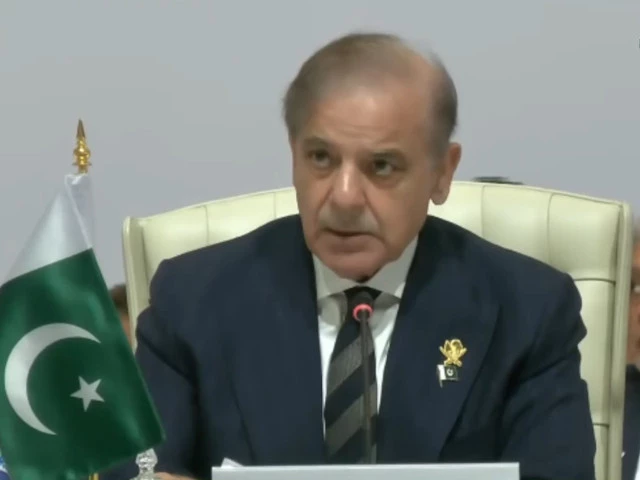Premier tasks provinces, federal government with ensuring swift repatriation amid escalating tensions with Kabul
Prime Minister Shehbaz Sharif. Photo: File
Prime Minister Shehbaz Sharif on Friday ruled out any further extension for Afghan refugees “illegally” staying in Pakistan and directed provincial governments and relevant authorities to ensure their “speedy and dignified” repatriation.
Chairing a high-level meeting on the issue, Shehbaz said Pakistan has “carried the burden for long enough” and that “those without valid visas will have to return home”.
Prime Minister Muhammad Shehbaz Sharif chairs a meeting on repatriation of Afghan refugees. Islamabad, 17 October 2025. pic.twitter.com/HDBGfqcKI0
— Prime Minister of Pakistan (@PMShehbazMedia) 17 October 2025
The meeting was attended by Chief of Army Staff (COAS) Field Marshal Syed Asim Munir, federal ministers, and Sindh, Balochistan and Punjab chief ministers as well as representatives from Gilgit-Baltistan and Azad Jammu and Kashmir (AJK). Khyber-Pakhtunkhwa (KP) was represented by Muzzammil Aslam after KP CM Sohail Afridi apologized.
Read: Winter risks bringing Afghan infiltration
“The brave people of Pakistan who sacrificed their loved ones in the war on terror are now asking, how long will we continue to carry this burden?” Shehbaz said.
The prime minister expressed concern over increasing incidents of terrorism linked to Afghan nationals and noted that Pakistan had hosted millions of Afghans for decades despite its own challenges. “It is alarming that attacks on Pakistan are launched from Afghan soil and that Afghans are found involved in such incidents.”
The meeting was informed that the phased repatriation process had begun and 1.47 million Afghan nationals have been sent back as of 16 October. The forum decided that no further grace period would be granted to undocumented Afghans.
The prime minister directed federal and provincial institutions to “work in close coordination” to complete the process without delay. “Only those Afghans who have valid visas will be allowed to stay in Pakistan.”
He directed the relevant authorities to ensure that the elderly, women, children and minorities are treated with dignity during the repatriation process. “We will not allow any abuse – but the law will take its course.”
Read more: Doha offers mediation in Kabul, Islamabad
Shehbaz said Pakistan’s leadership – including the deputy prime minister, foreign minister and defense minister – had repeatedly engaged with the Afghan interim government in Kabul to ensure that Afghan territory is not used for terrorism, but growing public frustration has made the issue urgent.
The meeting was also briefed on the expansion of exit points along the Afghan border to facilitate smoother and faster repatriation. It was emphasized that housing illegal Afghan residents or allowing them to stay in guesthouses was an offence.
The prime minister praised the armed forces for responding “with full force” to recent cross-border attacks from Afghanistan.
“Under the leadership of Field Marshal Syed Asim Munir, the Pakistan Army repulsed these attacks and proved as it has always done that our forces know how to defend the motherland,” he said.
The participants, including provincial and regional leaders, hailed Pakistan’s “diplomatic success” and praised the role of the prime minister and army chief in coordinating national efforts on the issue.
The meeting ended with a unanimous decision to strictly implement all recommendations regarding the repatriation of illegal Afghan nationals.
Heated edges
Meanwhile, the State Department has stated that the current Afghan Taliban regime is not representative of the Afghan people. “No formal government currently exists in Kabul and one group holds power by force,” the FO spokesman said.
Read also: Karachi’s decades-old Afghan camp is being emptied as land mafias clash with police
Tensions escalated on the night of October 11-12 when Afghan Taliban forces, backed by “Indian-sponsored elements of Fitna al-Khawarij”, launched an unprovoked attack on Pakistan along the border, according to the military’s media wing.
“The cowardly act, which included fire and a few physical raids, was aimed at destabilizing the border areas to facilitate terrorism and further the nefarious designs of the FAK,” Inter-Services Public Relations said in a statement.
The security forces, exercising the right of self-defence, decisively repulsed the attacks along the border and inflicted heavy casualties on Taliban forces and associated Khawarij terrorists, the ISPR said.
On October 15, the State Department announced that Pakistan and the Afghan Taliban regime have agreed to a 48-hour ceasefire following Pakistan’s ‘precision strikes’ on Taliban and terrorist hideouts in Kandahar and Kabul.
According to the ministry, the decision was taken at the request of the Taliban and with the mutual consent of both sides. During the ceasefire, both parties will conduct a constructive dialogue to make sincere efforts to find a positive solution to a complex but solvable problem, the ministry had said.
“This temporary pause aims to create space for meaningful discussions and promote stability along the border,” the ministry said in a statement.



